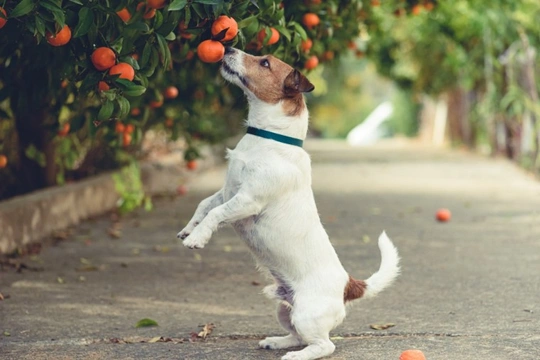
What fruits can you grow in your UK garden that won’t harm your dog if they eat them?
Most dog owners have a garden of some size that their dog uses, and dogs can be quite hard on gardens and make it hard to keep them tidy and thriving; particularly if you’re trying to grow ornamental plants, as many dogs seem to love digging up flowerbeds!
However, lots of keen gardeners who also have dogs grow a wide range of things quite successfully, and many gardeners also grow fruit as well.
Whilst unripe fruit or too much fruit of any type in general is harmful to dogs and will lead to an acute digestive upset, some fruits are harmful to dogs in and of themselves; like those in the grape family. Additionally, there are some fruits for which the flesh is not harmful to dogs but which comes with a pit or stone, which can be; like plums and cherries.
In fact, there’s quite a long list of fruits that are either poisonous to dogs or that can harm them in other ways, such as by means of having stones that might be swallowed, which every gardener should check out before introducing something new to their garden.
However, it is often harder to find out what fruits are safe to grow in a garden a dog uses, in so far as if your dog decided to munch on them they’d not be harmed, unless the fruit was unripe or they ate a lot of it, which might cause a digestive upset.
With this caveat in mind, this article will introduce you to seven fruits that can be grown outside in UK gardens that aren’t toxic to dogs – but like all things, which will still potentially upset their stomach if they eat too much.
Pears
Pears can be quite costly to buy in supermarkets, but planting a pear tree isn’t likely to result in edible fruit for several years to come, unless you already start off with a fairly mature tree.
However, if you’re prepared to play the long game or are lucky enough to have a pear tree in your garden already, pears won’t harm your dog if they happen to find a couple of ripe ones on the floor, or can even reach the lower branches to help themselves!
Apples
Apple trees of a wide variety of types can be grown successfully in the UK, and like pear trees, they tend to take years to start producing fruit of a meaningful size or in any meaningful quantities, although garden centres often sell small apple trees to get people started.
This is another fruit that’s safe for dogs that happen to find ripe ones on the floor (although the same cannot always be said if they’ve been on the floor so long they have begun to ferment) or if they can reach the branches to pick them off.
Strawberries
Considering how popular (and costly) strawberries are in the shops, they’re actually one of the easier fruits to grow in the UK, although their crops don’t tend to produce fruit as large as those you’ll see in supermarkets.
Strawberries are another safe fruit for dogs, which are more likely to result in annoyance that the dog stole your treat than a veterinary problem if your dog gets to them before you do…
Raspberries
Raspberries are less likely to appeal to dogs than strawberries but are very popular with us humans, and are something else that can be grown relatively easily in the UK too.
As long as they are ripe, eating a handful of raspberries won’t cause problems for your dog, and also they’re not the type of fruit most dogs will really be overly keen to eat anyway.
Blackberries
Blackberries are a fruit that often grows wild in the hedgerows in the UK, as well as being something that is easy to grow in most gardens in our climate.
Dogs will sometimes munch on these when they’re ripe as they’re in easy reach; but when it comes to wild ones to pick for yourself, be speculative about doing the same in case they’ve fallen victim to a dog cocking their leg there!
Blackberries won’t harm your dog if eaten, but their thorns can be a problem so take care.
Blueberries
Blueberries don’t tend to be found growing wild here, but are often sold potted to grow at home. They don’t tend to appeal much to dogs as they have a rather tart flavour that is more suited to people, but very ripe ones are much milder.
If your dog eats blueberries, this won’t poison them.
Blackcurrants
Finally, blackcurrants are another berry that sometimes grows wild in the hedgerows and that can also be grown at home. Like blueberries, they don’t tend to be targeted by dogs, but if you grow them at home and your dog does happen to eat some, this is not going to do them any harm unless they eat a huge amount.



